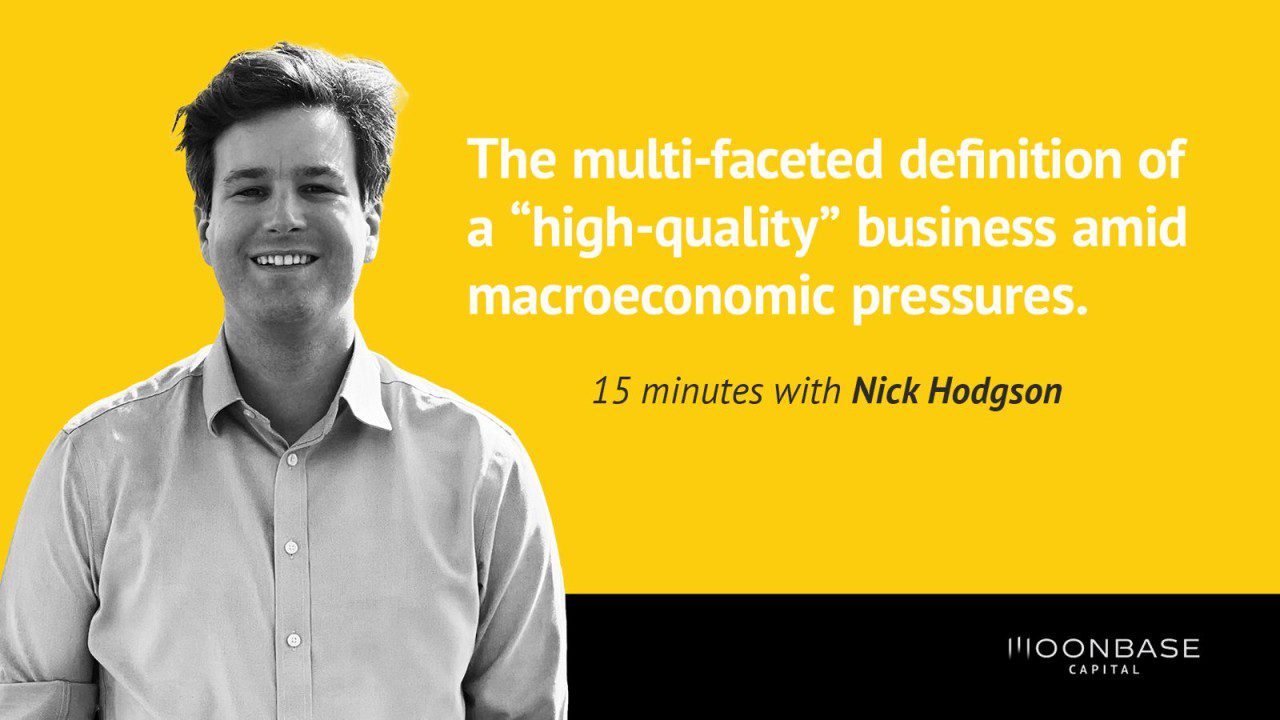
15 minutes with… is a Moonbase Capital series that picks searchers’ brains on current market conditions, what challenges they are facing and the actual technicalities of what it takes to be a searcher.
Nick Hodgson director of Edinburgh-based search fund Tinto Hill, is a searcher who has raised an initial fund of GBP 380,000 from international investors, and is now looking to acquire an SME in the UK, with a focus on Scotland and North East England.
Sneak peek at Nick’s origin story: Nick grew up on a farm outside of Edinburgh. He has a Bachelor’s degree in Politics from Newcastle University, and an Executive MBA from the University of Warwick . He started his career as a community manager for Scotland and North East of England at Deliveroo, launching it in the region, before joining Airsorted (later named Houst), and growing it to become the world’s largest Airbnb manager, where he led operations. He moved on to become VP of property operations at Awaze, before launching Tinto Hill.
MC: Which sectors are you most attracted to while searching for a potential acquisition?
NH: We’re industry-agnostic. However, in a broad sense, the sectors I’m most attracted to are business and energy services. These include testing, inspection and certification, and digital transformation in the business services sector, which I believe have a very healthy addressable market and reasonable EBITDA growth. In the energy services sector, I’m very interested in the wind operations and maintenance industry, for instance, which has a very high total addressable market and healthy margins. Additionally, Scotland has one of the largest wind farms in Europe.
I’vereviewed as many sectors as I can, looking at the core criteria famous in the search fund model. I am focusing on sectors with a high quality of revenue, which deliver mission-critical services to their clients, where I can add value to, given my experience.
MC: What do you look for in a company besides the financials?
NH: I’m looking for a high-quality business, firstly in terms of people. This would entail an owner with a non-economic reason to sell and a strong, second-tier management. Then, I look at the quality of the industry, meaning its size, growth, stability of primary demand, and a fragmented landscape with non-cyclical demand. Next would be the quality of operations, which need to be understandable, and I have to be able to identify areas that I can improve. Lastly, I’m looking for the quality of the business’ market position. It has to be mission-critical to its customer base and enjoy a competitive advantage.
MC: What macroeconomic trends are you basing your direction on when you’re looking for these deals?
NH: The energy transition is a core macro trend. The advantage I have, being based in Scotland, is that the government has placed a particular focus on it and is looking to be an international leader in the sector..
MC: And how are rising interest rates and the looming recession affecting what you do?
NH: The UK is under significant pressure from a number of complex, interconnected issues, including inflation, the Russia-Ukraine war, and stagnation in living standards. The current macroeconomic climate will reduce access to debt, which will result in more creative deal structures. This may include investors inputting additional capital. However, sellers also need to understand that these creative deal structures will result in increased seller financing.
MC: What geopolitical or economic trends are you watching out for?
NH: The impact of AI makes the evaluation of any sector or sub-sector interesting because we know it is going to have a huge impact, but we don’t know exactly how.
MC: Why did you decide to become a searcher?
NH: The main reason would be realizing my entrepreneurial ambition. My dad and grandparents had their own businesses, so it feels like it’s running in the family. I’ve also worked for high-growth businesses before in a very entrepreneurial environment, and I’ve truly enjoyed that. But having worked in the startup scene, I know that 90% of startups fail. Hence, the risk profile of a search fund is significantly lower, subject to finding a business of appropriate quality.
MC: Do you source your potential acquisitions through brokers or proprietary search?
NH: I do a mix of both. I think it’s healthy and sensible to have a deal pipeline that incorporates both methods. The UK is highly-brokered, which leads to brokers taking searchers very seriously. So, for a few months now, I spent a lot of time nurturing relationships with brokers. But I’m also actively reaching out to many business owners every day.
